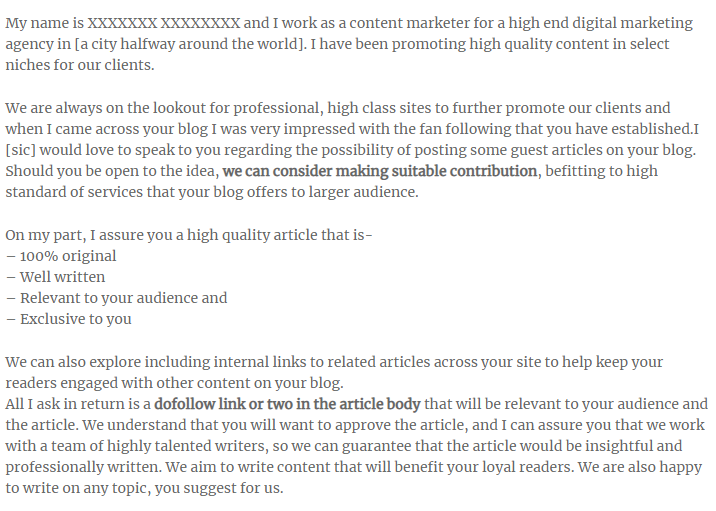How to Use Guest Blogging for Natural Link Building
What’s better than a box of chocolates for a content creator?
You guessed it — the byline.
Nothing gives me a fuzzier, beyond roses-and-chocolatey feeling than this: by Julia McCoy.
It gets even more romantic when my blog and name are featured in a prestigious site.
That’s what guest blogging is all about. Fame. Reputation. Success.
But it’s more than that. In fact, you can use guest blogging as a powerful strategy in your link-building toolkit.
Ready to dive in?
The Rocky History of Link Building Through Guest Blogging (How NOT to Do Guest Blogging)
Guest blogging started out beautifully.
It was like having a famous singer appear at your local theater or having a highly acclaimed author write the introduction to your book.
But like a ton of other SEO practices, things went awry.
People began jumping on guest blogging as a spammy tactic to gain coveted backlinks.
Here’s an email Google’s Matt Cutts received in 2014.

This email shows you exactly what went wrong with guest blogging.
Also, it tells you how not to do it.
Guest blogging isn’t about slapping your name onto a piece of sloppily written content just to get those quality backlinks.
So, what is good about guest blogging today?
The Secret of Getting Quality Links Through Guest Blogging
Let’s go back to the concert analogy.
You’re a rising singer with spectacular talent and a unique style.
However, there’s a problem: not many people know about you.
How do you get people to notice you?
The answer is by singing as a guest at a famous singer’s concert. You get an invite.
You go and wow the crowd with your vocal acrobatics.
After you’ve impressed them, you subtly ask them if they want to see your own concert.
Singing as a guest does two things for you:
- It connects your name to the prestigious singer the crowd already loves.
- It gives people the chance to glimpse the beauty and magic you can bring into their lives.
Guest blogging is no different.
When you write an authoritative, high-quality post in a well-known blog with thousands of followers, people will notice you. They’ll even start coming to your own blog.
But it doesn’t end there. When people discover your blog and see that you’re doing something they’ve never seen before?
They will link to you.
Here’s some inspiration before we dig into the how of guest blogging.
Larry Kim posted 40 Amazing Places to Learn Something New Every Day on Inc. If you look at the post, it’s useful, inspirational, and downright enjoyable to read.
The result? It got more than 40 backlinks.
So now, let’s dive into how you can become the next star guest blogger and earn yourself your own collection of quality, holistic links.
How to Guest Blog for Successful Link Building
Guest blogging isn’t about making a list of the most successful sites today and pitching to all of them.
If you want success, you need to follow the correct guidelines.
1. Be Selective About Where You Pitch
Pitching to one authoritative site that’s right for you is better than pitching to 100 authoritative sites that are wrong for you.
Here’s how to narrow things down.
Choose a Site in a Similar Niche
If you are in the content marketing niche, it’ll do you no good to guest blog on a fashion site.
Yes, readers will enjoy your post if it’s well-written and entertaining. But they don’t need your services.
So, the chances that they’ll check you out online are slim.
Review the Site’s Performance
After you’ve narrowed your search down to a select number of sites within your niche, check to see how well each one is doing online. These pointers indicate the site may be a good choice for your guest post:
- Domain authority of over 50.
- 10,000 or more social followers.
- Considered an industry leader.
- Has engaged, long-term readers.
Make Sure You’ll Get a Featured Bio
Even if you’ve been a huge fan of a site for years, never pitch for a guest post if you won’t get a featured bio.
You want your byline, a headshot, and a link back to your site for readers to follow. If you find out that you’ll be posting as a ghostwriter or simply a “Guest?” Run.
Unless all you want is bragging rights, of course.
2. Craft a Pitch that’s Impossible to Ignore
Imagine yourself pitching to a magazine like The New Yorker.
According to The Write Life, you have a 0.0000416% chance of getting published in the magazine!
So, what do you do?
You do all the required research, then create a pitch the editor can’t ignore.
It’s easier to get a guest post at a prestigious site than to get your story into the New Yorker. Still, it requires the same work ethic and skill.
Follow these steps to increase your chances of winning that guest post.
Do Your Research
Spend quality time on the site you want your guest post to appear. Take note of the kind of blogs they post. Which topics get the most attention? Is there anything missing that you feel you can address in a blog of your own?
Pitch to a Person instead of a Website
If you sound impersonal and generic, you will be ignored. Guest blogging is a relationship. It’s connecting with real people and forming lasting ties.
For example, I started my column at Huffington Post by directly emailing Ariana Huffington!
Dig in Deeper
Check out who else is guest posting on the site. Read their posts and visit their sites. Become a detective.
Don’t Ignore the Guidelines for Pitching
Not paying attention to guidelines will get your pitch deleted without being read.
Be Direct
Get straight to the point with the owner or editor of the site. Don’t bombard them with a cartload of details they don’t need. Instead, outline what you can give them in a few concise, succinct sentences. Show them you value their time.
Tell the Editor or Owner About Yourself
Listing your own site’s credentials is a good idea. No one wants links to low-quality sites on their blog. Also, blog editors and owners want to know who they’re working with.
3. Write a Guest Blog That’ll Have Readers Flocking to Your Site
Creating your pitch is tough but writing the guest post itself is even tougher.
Here are some tips that’ll make your writing resonate with readers.
Know What Your Audience Needs
People don’t read for fun (unless it’s literary fiction, of course). They read because they need something. Maybe they need information they can take action on, a service that’ll make things easier for them, or an inspiration to impact their dull, boring lives.
Your mission is to find out what that need is. When you do, you’ll be able to craft a guest post that’ll suck your readers in and have them chasing your site’s link.
Take a look at this example article in International Living.

People read International Living because they want to get insider tips on retiring abroad in style. One problem many of them face is trouble with banks and brokers. So, when they see this article? They read it.
People will read your post if you address their needs. It’s that simple.
Catch Readers with Your Headline
When people read your headline, they decide whether or not they’ll continue with your post.
Look at these examples of two headlines that address the same topic.
Headline number one:

Headline number two:

As a reader, you’d likely pass over headline one and click headline two.
Why?
Headline one is generic and uninteresting. The lowercase letters rob it of professionalism.
Headline two, on the other hand, has a huge promise for you. When you click, you’ll learn six essential proofreading skills. Plus, it uses power words like perfection, polish, glossy, and sheen.
If these words don’t make you picture clean, shining, perfect writing, I don’t know what will.
Go In-Depth with Your Content
Your content shows your readers who you are. When you guest post, don’t merely scratch the surface of your topic. Dive in and dive deep. Show your authority and expertise.
Here are some tips to help you dive deep into your topic.
- Keep your post up to your readers’ knowledge, expectations, and education. If you’re writing as a business expert, for instance, make your writing strong and statistically driven.
- Pick your ideas apart. Come up with initial research and then make a list of the questions that spring out of what you find. Answer those questions in your post.
- Back up all of your claims with credible sources. Add links to these sources for readers to dig in even deeper.
- Create an interesting angle. Think out of the box. Make it your goal to write something in a way that’s never been done before.
- Drive all your content towards a goal. What’s the main purpose of your blog? To teach readers a new skill? To inspire them? To make them understand a difficult concept? Keep this goal at the forefront of your writing and make every paragraph flow towards it.
- Be benefit-oriented. Before you sit down to write your post, list down at least six benefits people will get from reading it.
- Proofread exhaustively. Examine each paragraph one by one. If you find a paragraph that doesn’t contribute to your big idea? Weed it out.
Provide Content That’s Easy to Digest
The average reader will run when met with a long block of unbroken text. Since you don’t want that, follow these three steps for easily digestible content.
- Divide your blog into sections. Even serious readers won’t want to scour through endless blocks of text. It’s a good idea to divide your topic into sections, then subdivide those sections. Keep each division below 300 words. Numbered lists work wonderfully in keeping reader attention.
- Use visuals. Images bring your blog to life. Also, they help you illustrate points and explain concepts in an easily digestible and enjoyable way.
- Keep paragraphs short. Don’t go over six sentences for any paragraph. Break the paragraph in two if it’s over that number.
4. Funnel Your Readers to an Outcome
When you guest post, you’ll be given space in your biography section to add a link. Although you might be tempted to link to your homepage, don’t do that.
Instead, think of the outcome you want to achieve through the link. Do you want readers to sign up for your email newsletter? Check out your online store? Follow your blog?
Choose the best way you can get your product or service out there. Then, link to the page that gives you that outcome.
5. Reply to Comments on Your Post
Guest blogging isn’t putting your content out there and then forgetting about it.
It’s engaging with people on a real, personal level.
So, when readers comment on your post, leave them a reply. Answer their questions and engage with them.
By showing you’re active, you’ll be able to increase your conversion rates and put yourself front and center in readers’ minds.
Guest Blogging: The Secret to Indirect Link Building
Once your beautiful, well-polished content shines on a site with thousands of followers, the results are easy to predict.
Readers will come flocking to you. You will be recognized as an authoritative expert. Your blog will gain its own crowd of followers.
And of course, you’ll gain your own quality backlinks.
Summary
Timeframe: Ongoing starting month 3
Results detected: 4-12 months
Average blog posts per month: 4
Tools:
- BuzzStream
- BuzzSumo
- Alexa
Benefits:
- Get attention from readers of prestigious blogs.
- Establish your authority and expertise.
- Build links indirectly.
- Improve brand awareness.
- Increase traffic and leads.
Image Credits
Featured Image: Julia McCoy
All screenshots taken by author, November 2019
